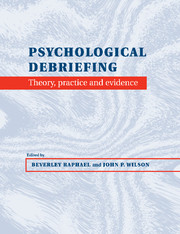Book contents
- Frontmatter
- Contents
- List of contributors
- Introduction and overview: Key issues in the conceptualization of debriefing
- Part I Key conceptual framework of debriefing
- Part II Debriefing: models, research and practice
- 5 Critical Incident Stress Management and Critical Incident Stress debriefings: evolutions, effects and outcomes
- 6 Debriefing with emergency services: Critical Incident Stress Management
- 7 Debriefing and body recovery: war grave soldiers
- 8 Debriefing and body recovery: police in a civilian disaster
- 9 Debriefing after massive road trauma: perceptions and outcomes
- 10 Debriefing and motor vehicle accidents: interventions and outcomes
- 11 Debriefing with service personnel in war and peace roles: experience and outcomes
- 12 Debriefing post disaster: follow-up after a major earthquake
- 13 Debriefing after disaster
- 14 Children and debriefing: theory, interventions and outcomes
- 15 Debriefing adolescents after critical life events
- Part III Adaptations of debriefing models
- Part IV Debriefing overview and future directions
- Conclusion: debriefing – science, belief and wisdom
- Index
15 - Debriefing adolescents after critical life events
from Part II - Debriefing: models, research and practice
Published online by Cambridge University Press: 06 January 2010
- Frontmatter
- Contents
- List of contributors
- Introduction and overview: Key issues in the conceptualization of debriefing
- Part I Key conceptual framework of debriefing
- Part II Debriefing: models, research and practice
- 5 Critical Incident Stress Management and Critical Incident Stress debriefings: evolutions, effects and outcomes
- 6 Debriefing with emergency services: Critical Incident Stress Management
- 7 Debriefing and body recovery: war grave soldiers
- 8 Debriefing and body recovery: police in a civilian disaster
- 9 Debriefing after massive road trauma: perceptions and outcomes
- 10 Debriefing and motor vehicle accidents: interventions and outcomes
- 11 Debriefing with service personnel in war and peace roles: experience and outcomes
- 12 Debriefing post disaster: follow-up after a major earthquake
- 13 Debriefing after disaster
- 14 Children and debriefing: theory, interventions and outcomes
- 15 Debriefing adolescents after critical life events
- Part III Adaptations of debriefing models
- Part IV Debriefing overview and future directions
- Conclusion: debriefing – science, belief and wisdom
- Index
Summary
EDITORIAL COMMENTS
This chapter describes a background of development and its implications for debriefing children and specifically adolescents, after a traumatic event. Studies relevant to this age group are reviewed, but are small in number.
The concepts of group debriefing and individual debriefing through a child interview technique are also discussed. Many of the reports reviewed provide few systematic data, although one study showed no positive benefits for the adolescent girls, for whom debriefing was provided either with or without group counselling sessions. Indeed their scores, on measures of anxiety and depression had significantly increased, and their scores on the Impact of Event Scale (IES) remained high. Another similar study with controls did however show some reduction on intrusion scores on the IES but no differences in depression or anxiety.
Stallard's own work was with debriefing provided more than three months later for seven survivors of a school minibus accident. Three months after the start of debriefing these young people showed positive changes (ie. a reduction of symptoms) on the IES, the whole being due to changes on the intrusion scale.
The author explores some important questions about debriefing: its conceptualization and what it is intended to achieve for adolescent groups; issues of the optimum time for intervention for children and adolescents; and whether, if provided after the Wrst few weeks it can it be seen to have a preventive role.
- Type
- Chapter
- Information
- Psychological DebriefingTheory, Practice and Evidence, pp. 213 - 224Publisher: Cambridge University PressPrint publication year: 2000
- 4
- Cited by



